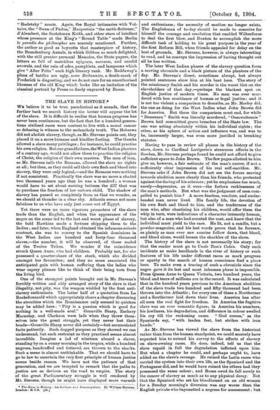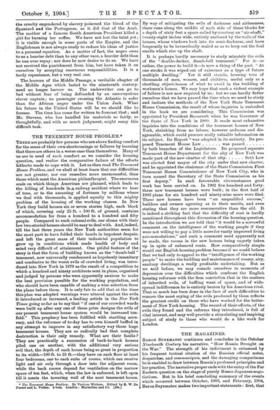of the slave. It is difficult to realise that human
progress has never been continuous, but the fact that for a hundred genera- tions civilised races were content to live with a moral cancer so debasing is witness to the melancholy truth. The Hebrews did not abolish slavery, though, as Mr. Stevens points out, they placed it on a more humane and kindlier footing. The Greeks allowed a slave many privileges ; for instance, he could practise his own religion. But our grandfathers, the West Indian planters of a century ago, would not allow them to practise the religion of Christ, the religion of their own masters. The men of iron, as Mr. Stevens Calls the Romans, allowed the slave no rights at all ; but then, as they could sell their own flesh and blood into slavery, they were only logical,—and the Romans were nothing if not consistent. Practically the slave was no more a chattel two thousand years ago than he was a hundred;. a woman would have to set about earning betimes the £37 that was to purchase the freedom of her unborn child. The shadow of slavery has passed so completely from us that we wonder, as weshould at thunder in a clear sky. Atlantis seems not more fabulous to us who have only just come out of Egypt.
Yet there were no more vigorous promoters of the slave trade than the English, and when the appearance of the negro on the scene led to the last and worst phase of slavery, the bold Hawkins made a fortune shipping them to the Indies ; and later, when England obtained the infamous asiento contract, she was to convey to the Spanish dominions in the West Indies one hundred and forty-four thousand slaves,—the number, it will be observed, of those sealed of the Twelve Tribes. We wonder if the coincidence struck Queen Anne, who had children. Probably not, for she possessed a quarter-share of the stock, which she divided amongst her favourites ; and they no more associated the anticipated gain with human suffering than the ladies who wear osprey plumes like to think of their being torn from the living bird. One of the strongest points brought out in Mr. Stevens's forcibly written and ably arranged story of the slave is that illegality, not pity, was the weapon wielded by the first anti- slavery enthusiasts. The latter half of a quotation from La Rochefoncauld which appropriately closes a chapter discussing the atrocities which the Renaissance only seemed to quicken may be added here : "Pity is a passion which is good for nothing in a well-made soul." Granville Sharp, Zachary Macaulay, and Clarkson were lads when they threw them. selves into the great struggle, yet they never lost their heads—Granville Sharp never did certainly—but accumulated facts patiently. Such dogged purpose as they showed we can understand, but such restraint as they practised seems almost incredible. Imagine a lad of nineteen aboard a slaver, standing by on a sunny morning in the tropics, while a hundred negroes, handcuffed and fettered, are thrown to the sharks. Such a scene is almost unthinkable. That we should have to go to law to ascertain the very first principle of human justice seems beside reason. We have not the patience of that generation, and we are tempted to remark that the paths to justice are as devious an the road to empire. The story of the great Parliamentary struggle is well rendered by MT. Stevens, though he might have displayed more warmth The Stsirooin History: his "Sorrows 11.41.1 HOsoniiistion. B Virithian Stevens: lauded: KT.& Vs.] and enthusiasm; the necessity of caution, no longer exists. The Englishman of to-day should be made to conceive for himself the courage and resolution that enabled Wilberforce- to deal the first blow, and Buxton to accomplish the more difficult task of holding to his great purpose in the year of the first Reform Bill, when friends appealed. for delay on the- best of grounds. Mr. Stevens, however, is always interesting to read, and he conveys the impression of having thought out all he has written.
The later West Indian phases of the slavery question form a moving chronicle and a black picture of the planters of the day. , Mr. Stevens's direct, sometimes abrupt, but always pointed sentences show him at his best here. The story of • the missionary Smith and his murder is the worst blot on the- slaveholders of that day,—perhaps the blackest spot on English justice of modern times. No man was ever mur- dered with less semblance of human or legal justice ; and it is not too violent a comparison to describe, as Mr. Morley did, the one as doing for the West Indies what John. Brown did for America. But there the comparison must end, for while " Demerara" Smith was literally murdered, " Ossawattemie " Brown had committed grave breaches of the State law. The one was acting absolutely within his individual rights ; the other, as his sphere of action and influence was, and was to- be, immensely larger, was even more justified in breaking- statutes.
Having to pass in review all phases in the history of the- slave, down to Cardinal Lavigerie's strenuous efforts in the- Soudan, Mr. Stevens perhaps found he could not afford to give sufficient space to John Brown. The few pages allotted to him. give us, however, a fair estimate of the man's career, if not a sufficiently clear impression of his real self-sacrifice.. Mr. Stevens asks if John Brown did not see the forces moving towards abolition more clearly than his friends, who protested. against the daring of his schemes ; yet he emphasises too much,. surely—deprecates, as it. were—the forlorn recklessness of the man's methods. But what was-the judgment of men com- pelled to punish him ? A more fearless, resolute, and cooler- headed man never lived. . His family life, the devotion of his own flesh and blood to him, and the tenderness of the- man who, after chastising his children, would offer them the whip in turn, were indications of a character intensely human,. but also of a man who had counted the cost, and knew that the individual must yield to the race. He lit, not a candle, but a powder-magazine, and his last words prove that he foresaw,. as plainly as man ever saw sunrise follow dawn, that blood,. and blood alone i would loosen the shackles of the slave.
The history of the slave is not necessarily his story; for- that the reader must go to Uncle Tom's Cabin. Only such incidents as make headlands in the river of history or such features of his life under different races as mark progress- or apathy in the march of human conscience find a place here. To make even a tracing of such a chronicle since the negro gave it its last and most inhuman phase is impossible. From Queen Anne to Queen Victoria, two hundred years, the blood and tears of millions are in the record. It was calculated that in the hundred years previous to the American abolition of the slave trade two hundred and fifty thousand had been thrown into. the Atlantic ; for every one of these a Northerner- and a Southerner laid, down their lives. America has after all seen the real fight for freedom. In America the fugitive slave was an ever romantic figure; in America his numbers, his lowliness, his degradation, and difference in colour swelled. his cry till, the reckoning came. ". God comes," as the Spaniards say, "with leaden feet, but strikes with iron hands."
As Mr. Stevens has viewed the slave from the historical. rather than from the human standpoint, we could scarcely hare expected him to extend his survey to the effects of slavery on slave-owning races. He does, indeed, tell us that the- slave repaid in full the degradation inflicted upon him But what a chapter he could, and perhaps ought to, have added on the slave's revenge. He ruined the Latin races who. carried the system into their own life, as the Spaniard and the- Portuguese did, and he would have ruined the others had they possessed the same colour ; and Rome owed its fall surely to. the cancer of slavery as much as to any physical decay. Not that the Spaniard who set his bloodhound on an old woman for a Sunday morning's diversion wan any worse than the English private who bayonetted a negress for amusement ; but the cruelty engendered by slavery poisoned the blood of the Spaniard and the Portuguese, as it did that of the Arab. The mother of a famous South American President killed a girl for burning her coffee. We have not lost the taint yet ; it is visible enough in some parts of the Empire, and the Englishman is not always ready to reduce his ideas of justice to a personal equation. As a matter of fact, the negro owes to us a heavier debt than to any other race, a heavier debt than lie can ever repay; nor does he now desire to do so. We have not received the punishment from him, but have taken it on -ourselves by accepting enormous responsibilities. It is a tardy repentance, but a very real one.
The horrors of the Middle Passage, a veritable chapter of the Middle Ages which lasted to the nineteenth century, -need no longer harrow us. The underwriter can go to bed without fear of being defrauded by an unscrupulous slaver captain; no passenger crossing the Atlantic is safer than the African negro under the Union Jack. What his future in the United States will be we should like to foresee. The time has come for writers to forecast that ; and Mr. Stevens, who has handled his materials so fairly, so -thoughtfully, and with so much judgment, might essay this .difficult task.











































 Previous page
Previous page